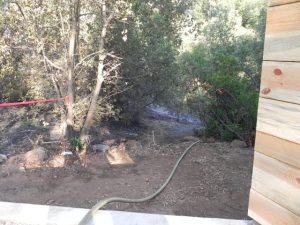University of California Cooperative Extension (UCCE) Master Gardeners of Tuolumne County recommend eight principles for successful gardening in the Mother Lode. This may be the most important principle – “Be Fire Safe.”
This newspaper article published nationwide in June of this year carried the headline “Deadly California Wildfires Spark Debate about Development.” Wildfires are not only caused by increasing temperatures and changing weather patterns. Bill Patzert, a climatologist at NASA’s Jet Propulsion Laboratory is quoted as saying that highly destructive wildfires are also based on “our misbehavior and our decisions how we zone and where we zone.” California’s burgeoning population is increasingly moving into what were historically rural areas. Communities, according to Bill Stewart, co-director of the Center for Fire Research and Outreach at the University of California, Berkeley, now exist where 50 years ago there was forest logging and cattle grazing.
As we move into the wildland urban interface or “WUI” (pronounced “wooey”), we must be aware of the dangers we create and the responsibilities we carry. People wanting to escape the city for the mountains will often choose a piece of property of 5, 10 or 20 acres. Parcels of this size can easily become overgrown, brushy and thick with small trees. Retirees, especially, may have difficulty maintaining a property of this size in a fire safe way. Careful community development planning is necessary.
So, what can you do? Be aware that the area where you live developed in response to frequent fire (historically 5-20 year recurrences). Your home is an obstacle to that fire pattern. However, there are some methods you can use to help protect your home while reducing the overgrowth of fuels that have created our recent catastrophic fires in California.
There is a host of tools located on-line at the Center for Fire Research and Outreach, part of UC’s Agriculture and Natural Resources program. http://ucanr.edu/sites/cfro/ There you can find a home owner’s fire assessment (click on “Resources”), take a tour of a WUI demonstration building and find an excellent free UC publication entitled “Home Landscaping for Fire.” http://cecentralsierra.ucanr.edu/files/52787.pdf
In a nutshell, improve the fire safety of your landscaping by practicing the three R’s: Remove, Reduce and Replace. Create a “clean and green” defensible space 30 feet around any buildings. Remove ladder fuels – branches, limbs and brush – up to 15 feet above the ground. Reduce the number of shrubs and trees in the space from 30 feet to 100 feet (or to the property line) to create a reduced fuel zone. Replace fire prone vegetation (another reason to hate Scotch, Spanish and French broom for their accumulation of dead vegetation) with green islands and fire breaks.
We have witnessed the recent effects of our severe California drought on too many trees in an area affected by changing weather patterns. The UCCE Central Sierra webpage, http://cecentralsierra.ucanr.edu/, carries extensive information about bark beetles and dead and dying trees. The link “Fire Recovery Information” will take you to resources about surviving wildfire, including “Firescaping – Landscape Design” and “Selecting Firewise Plants.”
There is a wealth of additional resources located on the Cooperative Extension Central Sierra webpage. Homeowners (and renters) can find water conservation tips, grass removal methods, and drought irrigation tips at http://cecentralsierra.ucanr.edu/Master_Gardeners/Drought_Resources/ . Information for ranchers and growers can be found at: http://cecentralsierra.ucanr.edu/Agriculture/Irrigation/
Rebecca Miller-Cripps is a University of California Cooperative Extension Master Gardener of Tuolumne County. Information is provided from the brochure “Foothill-Friendly Gardening” available from the UCCE office in Sonora, 52 North Washington Street, 209-533-5695 and can also be found online: http://ucanr.edu/sites/Tuolumne_County_Master_Gardeners/Foothill-Friendly_Gardening/.


